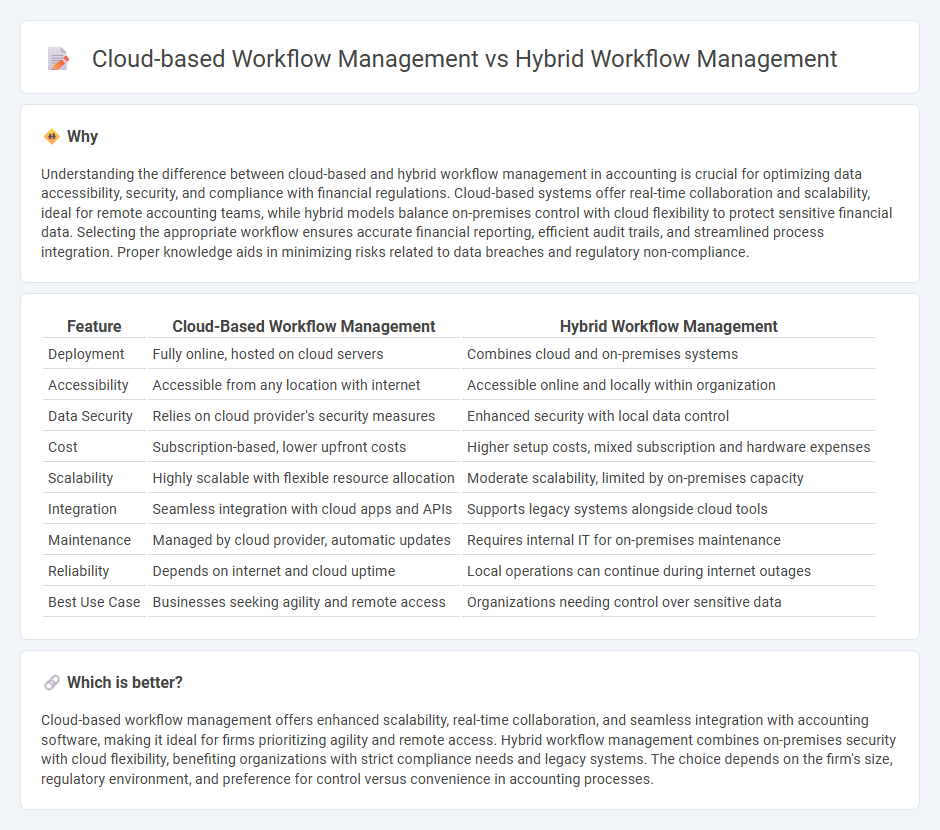
Cloud-based workflow management in accounting offers real-time data access, automated processes, and seamless integration with various financial software, enhancing efficiency and accuracy. Hybrid workflow management combines on-premise and cloud solutions, enabling flexibility, data control, and compliance benefits for organizations with complex accounting needs. Explore the advantages of each system to optimize your accounting operations effectively.
Why it is important
Understanding the difference between cloud-based and hybrid workflow management in accounting is crucial for optimizing data accessibility, security, and compliance with financial regulations. Cloud-based systems offer real-time collaboration and scalability, ideal for remote accounting teams, while hybrid models balance on-premises control with cloud flexibility to protect sensitive financial data. Selecting the appropriate workflow ensures accurate financial reporting, efficient audit trails, and streamlined process integration. Proper knowledge aids in minimizing risks related to data breaches and regulatory non-compliance.
Comparison Table
| Feature | Cloud-Based Workflow Management | Hybrid Workflow Management |
|---|---|---|
| Deployment | Fully online, hosted on cloud servers | Combines cloud and on-premises systems |
| Accessibility | Accessible from any location with internet | Accessible online and locally within organization |
| Data Security | Relies on cloud provider's security measures | Enhanced security with local data control |
| Cost | Subscription-based, lower upfront costs | Higher setup costs, mixed subscription and hardware expenses |
| Scalability | Highly scalable with flexible resource allocation | Moderate scalability, limited by on-premises capacity |
| Integration | Seamless integration with cloud apps and APIs | Supports legacy systems alongside cloud tools |
| Maintenance | Managed by cloud provider, automatic updates | Requires internal IT for on-premises maintenance |
| Reliability | Depends on internet and cloud uptime | Local operations can continue during internet outages |
| Best Use Case | Businesses seeking agility and remote access | Organizations needing control over sensitive data |
Which is better?
Cloud-based workflow management offers enhanced scalability, real-time collaboration, and seamless integration with accounting software, making it ideal for firms prioritizing agility and remote access. Hybrid workflow management combines on-premises security with cloud flexibility, benefiting organizations with strict compliance needs and legacy systems. The choice depends on the firm's size, regulatory environment, and preference for control versus convenience in accounting processes.
Connection
Cloud-based workflow management and hybrid workflow management intersect by combining remote accessibility and on-premises control to optimize accounting processes. Cloud-based systems allow seamless data integration and real-time collaboration among accounting teams, while hybrid workflows enable sensitive financial data to be securely managed within internal networks. This synergy enhances accuracy, compliance, and efficiency in accounting operations across multiple platforms.
Key Terms
Integration
Hybrid workflow management integrates on-premises and cloud applications, enabling seamless data flow and process automation across diverse platforms for enhanced operational efficiency. Cloud-based workflow management relies entirely on cloud infrastructure, offering scalability and real-time collaboration but may face limitations in integrating legacy systems. Explore further to understand which integration strategy best fits your organizational needs.
Scalability
Hybrid workflow management systems combine on-premises infrastructure with cloud resources to offer flexible scalability, enabling organizations to allocate workloads dynamically based on demand while maintaining control over sensitive data. Cloud-based workflow management platforms provide virtually unlimited scalability through global data centers, supporting rapid expansion and seamless integration with various cloud-native tools and services. Explore the benefits and limitations of each approach to determine the best fit for your scalability needs.
Data Security
Hybrid workflow management combines on-premises infrastructure and cloud services, offering enhanced control over sensitive data by keeping critical information locally while leveraging cloud scalability. Cloud-based workflow management centralizes data in cloud environments, which can introduce vulnerabilities but benefits from advanced security protocols, regular updates, and compliance certifications such as SOC 2 and GDPR. Explore further to understand how these approaches balance flexibility and data security in diverse operational contexts.
Source and External Links
Hybrid Project Management For Hybrid Workflows - Meegle - Combines traditional and agile project management methods to create flexible, customized workflows that adapt to diverse team structures and project needs.
Workflow Automation in Hybrid Work: Challenges and Solutions - Highlights the importance of integrating communication and workflow tools to overcome coordination challenges in hybrid environments where teams work across locations and time zones.
Hybrid work software: 10 tools you may not have heard of - Wrike - Showcases platforms like Wrike that enable seamless project management, communication, and automation for teams working both remotely and in-office, keeping workflows unified and efficient.
 dowidth.com
dowidth.com